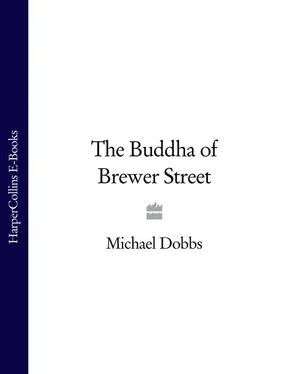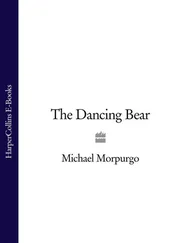THE BUDDHA OF BREWER STREET
MICHAEL DOBBS

To Naljorma ’ö-Sel Nyima Chèdröl Khandro.
May we never forget how to laugh and to love.
Cover
Title Page THE BUDDHA OF BREWER STREET MICHAEL DOBBS
Dedication To Naljorma ’ö-Sel Nyima Chèdröl Khandro. May we never forget how to laugh and to love.
PROLOGUE
ONE
TWO
THREE
FOUR
FIVE
SIX
SEVEN
EIGHT
NINE
TEN
ELEVEN
TWELVE
THIRTEEN
POSTSCRIPT
About the Author
Also by the Author
Copyright
About the Publisher
Tibet, 1959
Death arrived in the hour before dawn, but if it counted on an element of surprise it had reckoned without Kunga Tashi. And the geese.
Kunga Tashi was attending to the first daily duty of many young monks. He was helping prepare a churn of butter tea for his elders. It wasn’t yet sunrise and spring had still to find its way through the thick monastery walls, yet Kunga was happy. The kitchen was welcoming and warm, heated by the constant fires and filled with encouraging aromas. Far better than being told to fetch the water, which was usually hiding beneath a thick layer of ice at the bottom of the well, or being sent directly to the draughty memorizing class where he would have to squat for endless hours reciting scripture and fighting the temptation to fall back to sleep. Anyway, kitchen duties meant he got his tea first.
He dropped into the steaming churn another scoop of the pungent butter that gave the tea its characteristic kick, enough to spark the enthusiasm of the drowsiest of monks, and threw a pat of yak dung on the fire. These moments were special for Kunga. Barely fourteen and with a sense of mischief as unbalanced as that of any boy of his age, nevertheless he had an anticipation of life that stretched considerably beyond his years and dawn was the most precious moment of his day. As the early light began to burn across the mountain peaks he ran to the unglazed window from where he could look down upon the Lake of Four Winds. The lake was the colour of deepest lapis, its water still and brooding. Mystical spirits were supposed to live in its depths, although Kunga had never seen them. He never lost hope that some day he might catch one by surprise, hiding in the mists or creeping back through the shadows of early morning. But all he could see was a scattered flock of sheep grazing stubbornly on its banks and the reflection of the mighty Himalayas, covered in perpetual snow that steamed and caught fire in the early sun.
It was because he had his head stuck out of the window that Kunga was the first to hear the approach of Death and its workmen. Sound carries great distances in the emaciated air of Tibet and they were still three miles down the valley, just entering the village. The startled cries of old Wangmo’s geese gave the alarm. At first Kunga could see only dust, a cloud that rose above the low rooftops, but it was drawing closer. Shouts echoed through the bazaar. Followed by a single shot. Then silence, except for dogs and geese. And the tramp of boots. Not Tibetans, these. Not in metal-tipped boots.
Chinese.
They had come the previous week. A bomb had gone off in the provincial capital, Nagormo, and they suspected the monks. They always suspected the monks. If the sun didn’t shine, if the barley ran short, if the roads turned to mud, it was always the fault of the monks. Superstitious lot, these Communists. And sickly, too. They couldn’t take the altitude; many of them got sick, frothed pink at the mouth and fell over. Some died. Those that didn’t blamed the monks. For everything, particularly the bombs.
A week ago they had gathered all the monks in the monastery’s main courtyard and issued a warning. Any more trouble ‘from splittists and insurrectionists’, as they called them, and retribution would be swift. While the officer threatened, the troops had trashed the living quarters and dormitories. But, strangely enough, not the temple or the burial chortens . Yes, superstitious lot, these Communists. Kunga had made up a song about them, about how all Chinese soldiers fell over, defeated by the effects of heavy Tibetan alcohol and thin Tibetan air. The other boy monks had laughed. Now, as he saw the column approaching, he wished it were true.
More shots. Kunga jumped in alarm and ran through the corridors shouting at the top of his voice. Soon others were joining in and their cries cascaded down the long stone passages, the noise dragging the abbot from his bed. The head of the monastery was elderly, rheumy-eyed and still dishevelled with sleep, his wits dulled by declining years, and he danced in anxiety as he sought to discover the reason for the disturbance. When he was told, he danced some more while he tried to decide what he should do about it. All around him monks were gesticulating and offering him every sort of advice. This served only to confuse him further, and it was several minutes before he was able to come to a decision. He gave one hop, then another, like a crane balancing on one foot, then ordered the gates to be shut.
The only entrance to the monastery was by way of a narrow bridge across a precipitous ravine. Security, of sorts. Particularly with the gates locked. But although he had given his orders, the abbot continued his inelegant dance, wary of the Chinese and fearful of the consequences of defying them. They could be so short of temper. A fresh hop. A wail of indecision. A line of mantra seeking protection. Then he turned a full circle, his monk’s shawl streaming out behind him, and changed his mind. The gates should be left open after all.
More confusion. Raised voices. Even the ancient hinges joined in with screeches of complaint. It took the combined efforts of several senior monks to turn the abbot yet again, by which time the Chinese had drawn much closer, but at last he was persuaded. The heavy wooden gates were barred tight.
While his elders argued, Kunga climbed the outer wall of the monastery. From here he could see the Chinese troops clearly, ragged in dress but tight in formation, their faces and uniforms smeared in the eternal dust blown up from the dry Tibetan plains. The officer rode a mule, the rest were on foot. No vehicles, none of the great grinding tanks Kunga had heard about. And no way through the gates. The monastery was safe, for a while. The monks had food for weeks, and they had the well. A few old rifles, too. Kunga desperately hoped the weapons would be used. To a Buddhist all life is sacrosanct – flies, worms, even Chinese – but there is a bit of cowboy in every fourteen-year-old. It would be like hitting a mad dog. Why, it was almost a public duty, he told himself.
Boys are creatures of wild imagination, and suddenly Kunga wondered if the troops had come to look for him, to punish him for his ribald song. He felt sure that somehow they had found out. He grew afraid, and the butter tea turned to stone in his stomach. Cautiously he peered over the parapet of the monastery wall as the Chinese assembled on the other side of the bridge. There were more than two hundred, he reckoned, many more than had come last week. He wasn’t to know that another bomb had gone off, inside the town hall at Nagormo, killing the Chinese administrator who had recently taken up residence. After that there weren’t going to be any more warnings.
The officer sat on his mule on the far side of the bridge and through an interpreter demanded to speak to the abbot. In the name of the Central Committee of the Communist Party of the Tibetan Autonomous Region, open the gates! Hesitantly, the abbot raised his head above the parapet. Who was this Central Committee of the Communist Party of whatever it was? he responded. He’d never heard of such a thing. The officer shouted back that the abbot was speaking like an agent of imperialism. Even through an interpreter there was no hiding the anger. I owe allegiance to no one other than His Holiness the Dalai Lama, the abbot answered, growing emboldened, his head held higher – he always enjoyed a good debate. Your Lama, the monk-king, is gone, the Chinese replied. Impossible! His Holiness’s position is guaranteed under the Seventeen Point Agreement between Tibet and China along with many other … You’re wasting your breath, old monk. He’s gone. Deserted you. Crawled away to India. Exile. So open your stinking gates.
Читать дальше













